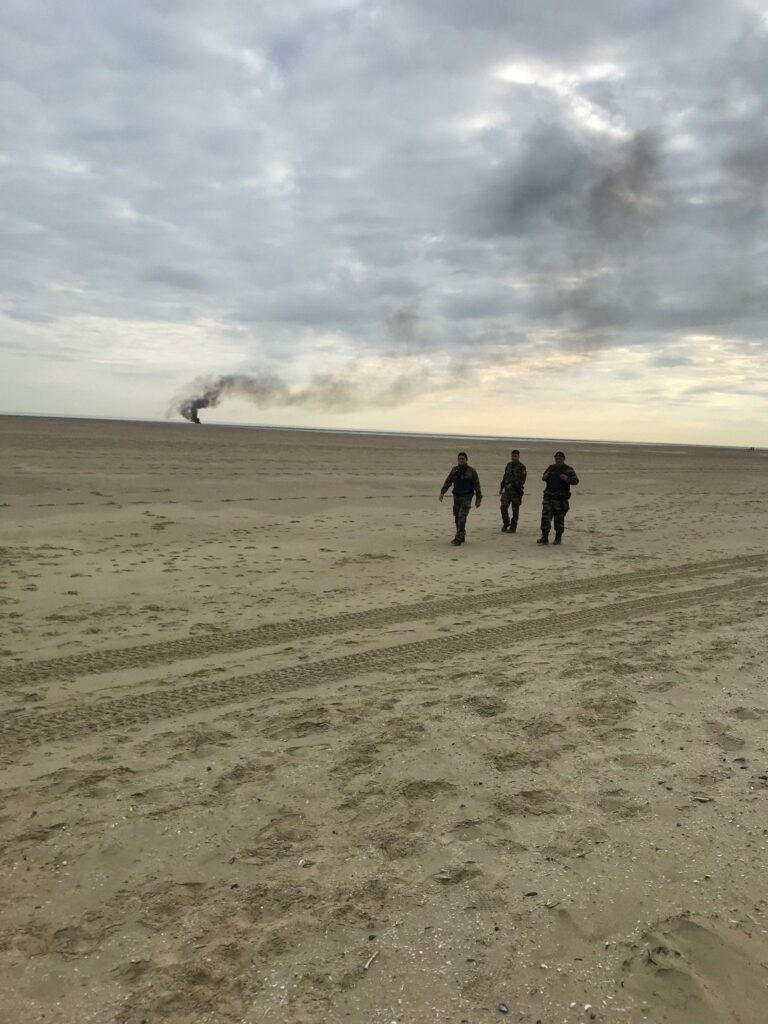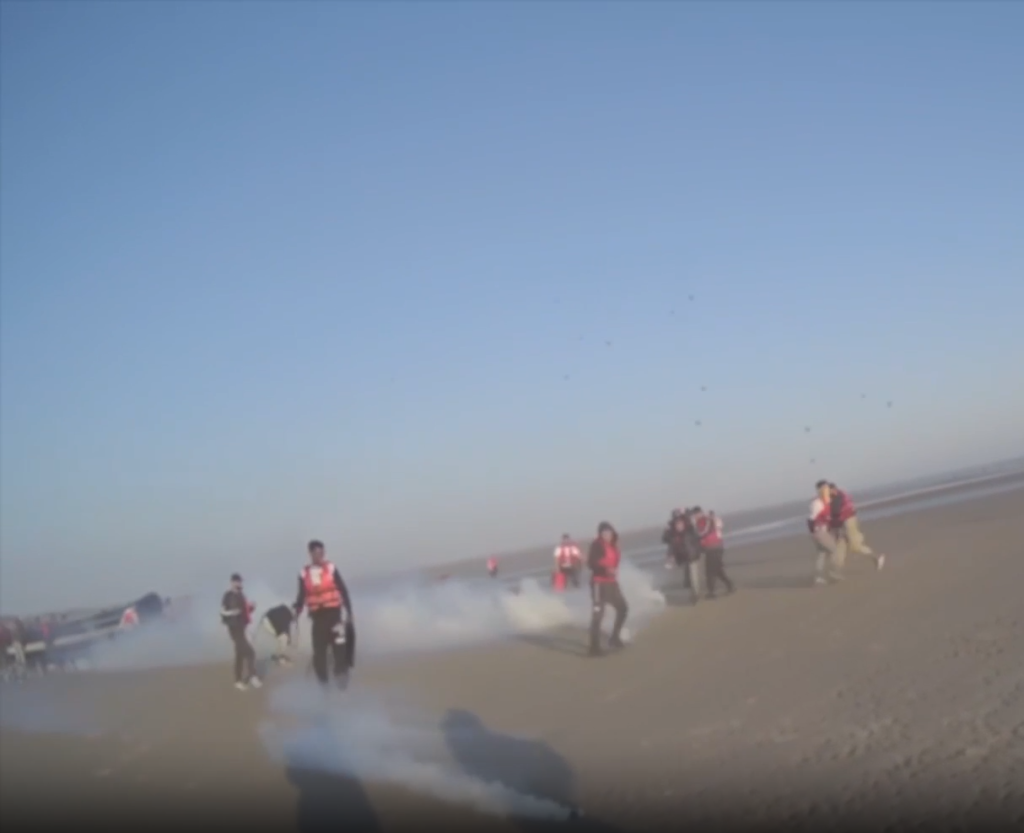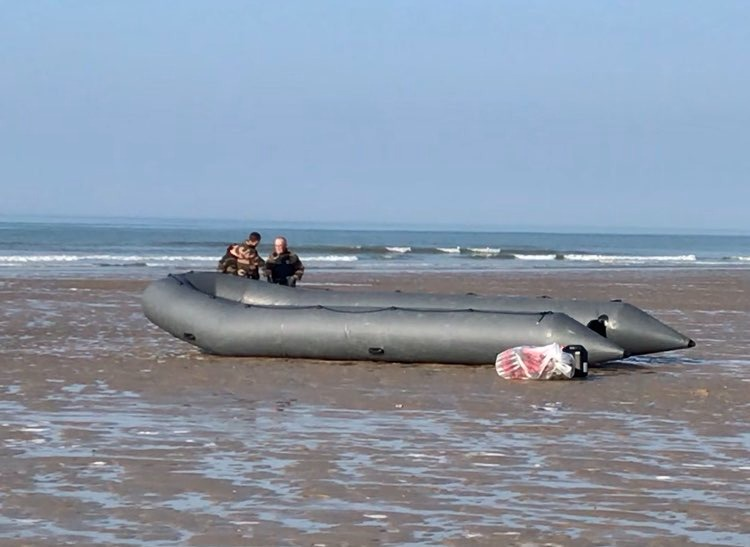On 14 January 2024, around 2am CET, another five people were killed attempting to cross the Channel to the UK. Survivors report that their dinghy collapsed near the beach of Wimereux, north of Boulogne-sur-Mer, as more than 70 people tried to get onboard during the launch. The Préfecture maritime’s press release states the police forces present first tried rescuing the people returning to the beach, as rescue boats and a helicopter spotted four unconscious people in the sea. Later in the morning, a walker discovered a fifth body washed up on the beach. In addition to the five who died, one person was taken into intensive care in the Boulogne hospital due to severe hypothermia, and another 33 needed additional care ashore after the incident. The identities of those who died have not yet been officially published. Testimonies of survivors identify them as four Syrian nationals; two aged 14 and 16. The fifth person remains unidentified but is thought to be a man from the Middle East.
This incident is the most recent in a disturbing trend we have observed develop over the latter part of 2023: an increase in the loss of life in the Channel very close to the French beaches and often in the presence of police.
The increasing activities of French police since the newest Franco-British declaration in March 2023 have had two main consequences:
- Fewer dinghies are reaching the French coast, causing dangerous overcrowding and chaotic embarkations;
- More police attacks on the dinghies as they launch, provoking panic and further destabilising an already unsafe situation.
The result has been not only more dangerous and deadly embarkations, but further injury and trauma for travellers at the hands of police, as well as the increased separation of families.
In this report we show the evolution in state policy and practices which are responsible for this trend, while drawing attention to those who lost their lives as a result.
More deadly incidents
Since the start of 2023 there has been an alarming increase in the number of deadly incidents in the Channel compared with 2022. Of the 29 people1 known to have died at the Franco-British border last year according to Calais Migrant Solidarity, at least 13 lost their lives in six incidents related to sea crossings. This includes the shipwreck of 12 August in which six Afghan men drowned.2 This is significantly more than the six people known to have lost their lives in three events related to sea crossings in 2022.
There is a common misperception that people most often die in the Channel far out to sea, when the search and rescue response is not properly initiated or help takes too long to arrive. This is understandable considering the shipwreck of 24 November 2021 where the UK and French coastguards refused to assist a group of more than 30 people, passing responsibility back and forth to one another. Only two people survived. The misperception may also have been bolstered by the shipwreck of 14 December, 2022 in which up to four people lost their lives, and more are still missing, despite the authorities being informed of their distress. See our analysis of what really happened here. However, as a result of their previous failures, the Coastguards have since improved their organisation, coordination, and resources for search and rescue missions on both sides of Channel. French boats routinely shadow dinghies as they make their way to the UK to be on hand to rescue if necessary, and the UK Border Force anticipate the arrivals and rescue people as they cross the borderline
What we observed last year, however, is that the deadly incidents all happened despite the presence or near immediate intervention of French rescue boats, for example on 12 August, 15 December 2023 and 14 January 2024. Even more concerning is that they all occurred on or within sight of French shores. The cause in all of the cases seems to be the same; the dinghies being overcrowded and failing shortly after departure, or dangerous situations created by chaotic launches.
2023 Deaths during sea crossing attempts
12 August: 6 Afghan men drown after the sponson of their dinghy of around 65 people collapses off of Sangatte.
36 survivors are taken to the port of Calais by the French coastguard, and 22 or 23 more are taken to Dover by the British coastguard. 2 people remain missing at sea.
Survivors told us their dinghy was moving slowly because of the high number of people (65 or 66). One of the sponsons gave out suddenly and half of the travellers were thrown into the water. Some tried to swim to the shore as they reported they could still see Sangatte. The search and rescue operation included 5 French assets, 2 UK assets, a French helicopter and aeroplane. The search and rescue operation was not able to recover all the travellers because most of them were already in the water when the first vessel arrived on scene. Two survivors are in custody in France, accused of piloting the dinghy.
26 September: A 24-year-old Eritrean woman dies in Blériot-Plage after being asphyxiated in a crush of 80 people trying to board one dinghy.
Witnesses told us a group approached the dinghy at the last moment before it departed and attempted to get onboard too. The dinghy was already overcrowded and this intervention led to mass panic among travellers. We know of at least two Eritrean families who were separated as some were pushed out of the boat and others unable to leave due to physical pressure from the mass of people. Wudase, a 24 year old woman from Eritrea was unable to get out and died from asphyxiation, crushed underneath the other travellers. Her body was lowered from the boat and around 75 people continued their journey to arrive in the UK.
8 October: A 23-year-old Eritrean man is found drowned in Merlimont, after 60 people in dinghy collapsed near the beach.
Around 60 people tried to board a dinghy towards the UK but the craft was unable to take the weight of the people and collapsed. The travellers swam or waded back to the shore but one man, Meron, was unable to swim and drowned at the beach. The emergency services on scene were unable to resuscitate him.
22 November: Three people drown off of Equihen-Plage as the dinghy collapsed in sight of the shore. 57 survivors return to the beach.
Two bodies, one man, Aman and a woman, Mulu were recovered on scene. A third body, of Ezekiel, a man also from Ethiopia was found on the beach of Dannes on the 4th of December.
15 December: One Kurdish man name Rawezh from Iraq drowns 8kms off the coast of Grand-Fort-Philippe after attempting to cross to the UK by sea. 66 other people are rescued.
As a French Navy vessel military approached the dinghy at around 1am, the crew informed CROSS Gris-Nez that one of the dinghy’s tubes had deflated and that some people were in the water. Despite the fast response of the French, it was already too late to recover all of the people alive. Two young men Hiwa and Nima both Kurdish Iranian are still missing after the incident.
15 December: A Sudanese man named Ahmed drowns.
An overloaded boat struggled to leave from Sangatte’s beach amidst a cloud of tear gas launched by the French police. Some people fell into the water as the dinghy turned around due to a non-functioning engine. One young man from Sudan drowned, trapped under the collapsed dinghy, and died later from cardio-respiratory arrest in hospital.
What changed?: dangerous deals
We directly link the recent increase in the number of deadly incidents to agreements between the British and French governments to ‘Stop the Boats’. Since the introduction of juxtaposed border controls in the 1990s there has been intense cooperation between the French and British in attacking and harassing people on the move in Northern France to prevent and deter them from crossing to the UK. The UK gives huge sums of money to France to intensify its policing of the border in the North, and secure its ports. From 2014 to 2022 £319m was handed over according to the House of Commons Library. This included £150m in four deals between 2019 and 2022 focused on stopping boat crossings.

Dune buggy tracks, gendarmes from Operation Poseidon and smoke coming from a boat punctured by the police then set on fire, Oye-Plage, Alarm Phone, 17 May 2023
This money paid for an increase of the numbers of gendarmes patrolling the coast under Operation Poseidon; more surveillance tech including night-vision goggles, drones, aeroplanes, and ANPR cameras on the roads; and several all-terrain vehicles for patrolling the beaches and dunes. This equipment has made the French police and gendarmes more effective at detecting stashed dinghies, engines, fuel and life-jackets as well as groups of people while they wait for several hours hidden in the dunes before a crossing. It also marginally increased their ability to disrupt departures on the beach, but they remained unable to prevent most on a busy crossing day. Additionally, the deals increased law enforcement cooperation and intelligence sharing between the French and British to dismantle the networks of those who organise the journeys, as well as disrupt their supply chains.
Despite the vast sums put up by the British, previous deals were criticised for still not providing the French with enough resources to ‘Stop the Boats’. They also took place in a period of cooler relations between France and Britain in the post-Brexit period of Johnson’s premiership when the French may have been less enthusiastic about being Britain’s border police. Last March, however, both governments doubled-down and made a new declaration in which the UK promised £478m to the French over three years for 500 more police, a new detention centre, and more surveillance capacity ‘to enable swifter detection of crossing attempts’ and ‘monitor a larger area of northern France and prevent more crossings’. It is after this deal that we have really noticed an uptick in the numbers of police interventions to stop dinghies being delivered to the coast, violence on the beaches (and sometimes at sea) to stop them launching, and by consequence the number of deadly incidents occurring at or near the shores.
Consequences of the new deal
1: Dangerously overcrowded dinghies
Despite the fewer overall number of people crossing in 2023 compared to 2022, each dinghy making the trip was more crowded than in any previous year.
Illustrated in the graphs above, the 47 days with the highest average number of people per dinghy ever all took place in 2023. The highest, 26 September 2023, had an average over 70, and there were 27 days with 56 or more people per dinghy, with all except one being after June. By comparison, the highest average day in 2022 saw not-quite 53 people per dinghy. These averages do not show the actual figures of each dinghy which have recently been stretching to more than 70, and sometimes 80. Meanwhile the number of crossings on any given day has gone down.
A key factor driving this overcrowding are the police operations against the logistical networks to organise the dinghies used for crossings, which stretch as far as Turkey and other European countries like Germany. The vehicles and drivers which do the deliveries to the French coast during periods of good weather are also targeted by police on the coastal roads. The UK government recently boasted that in 2023 246 people were arrested as ‘people smugglers’ and an international operation led to the seizure of 136 dinghies and 46 outboard motors.
These attacks on the supply chain, however, do not reduce the overall demand. They simply mean there are fewer total vessels for the overall number of passengers. It has been observed that, with fewer boats reaching the shores on a crossing day, people who are expecting to travel try to force their way onto any dinghy that has been delivered and inflated. This had led to one person being crushed to death inside a dinghy as well as others being pushed out into the sea. It also means that the extremely overcrowded dinghies are failing close to the French shores, like in the case of 12 August 2023.
2: Increased police violence
Increased police violence on the French beaches is the most visible consequence of the new ‘Stop the Boats’ deal, and exacerbates the dangers of already overcrowded embarkations.
In previous years, the fewer numbers of police patrolling the beaches were unable to deal with the large groups of people who gathered during a dinghy launch, and many times they chose to look on rather than intervene. They also had difficulties to cover the whole stretch of coastline between Belgium and Berck. Now with more aerial support, double the number of officers, and increased resources like dune buggies the police are more able to intervene at the moment of departure. Typically they will fire tear gas at the people to try and disperse them and then use knives to slice the dinghy. We have also been told about policing using ‘less-lethal’ grenades and wading into the sea to cut a dinghy as people try to board it and start the motor.
The police’s presence and their attacks create panicked and dangerous situations in which dinghies launch before they are fully inflated and in which people have to scramble on board whilst in water up to their necks. During these moments people have drowned in the shallow water like on 8 October, and families have been separated like on 26 September 2023. The danger of the police attacks compounds that of overcrowding. It is now common to observe chaotic embarkations where more than 70 or even 80 people all try at once to get on an inflatable of just a few meters length while the police try to stop them. We have also been told that if the police do successfully destroy a dinghy as it launches the would-be travellers will look to get onboard another rather than give up, again increasing the risks of overcrowding.
The British authorities have proudly acknowledged the increased violence, publicising a French police officer’s bodycam video where we see tear gas being used indiscriminately against a group of people which we know included those in a situation of vulnerability. In a statement celebrating the fact that two people shown in the video trying to hold the violence of the police at bay were arrested and jailed in the UK, the Home Office states:
“Tension on French beaches is increasing due to the successful efforts of law enforcement in frustrating this organised criminal enterprise. Incidents like this highlight the complex and brave work of our French colleagues in the face of challenging conditions.”

Still from French police bodycam showing them teargassing a group of people during the launch of a dinghy, June 2023
Despite the increased violence on the shore, for now, it still appears that the policy of the French is to not intervene to stop the boats once they are at sea and underway. This illustrates a clear contradiction between the apparent concern for safety of life while at sea, and creating extremely dangerous situations for people by attacking their dinghies as they launch.
No borders, not ‘Stop the Boats’
The hypocrisy of the French and British governments is that their increased border policing activities, which they sanctimoniously describe as protecting people who have to travel to the UK by boat, have only made their crossings more dangerous. Unfortunately it seems these policies will only continue over the coming years, evidenced by the three year funding agreement from March. We must then expect only more victim blaming and lies for each death in the coming years that will occur as a result. The people who continue to have to make this journey, denied access to the safe ferries and trains the rest of us are able to take, are being sacrificed for the sake of politicians’ electoral ambitions. What those politicians understand, but do not want to admit, is that it is impossible to ‘stop the boats’ so long as the border exists. Further militarisation and police intervention will only increase the number of people who die, as we have been seeing. How far the states will go in pursuing their policies of harm and death in the name of protecting their border remains to be seen. In the meantime we must continue doing all we can to not only present them the account of the consequences for their obstinance, but practically organise against it, together with those who already doing so.
1Although they often receive more coverage in the media, fewer people died at sea than during attempts to cross by lorry or train.
2A further two people are still missing at sea from this incident. While still unconfirmed, the remains of two people suspected to be migrants from this shipwreck have washed up on the beach in Texel, the Netherlands.
